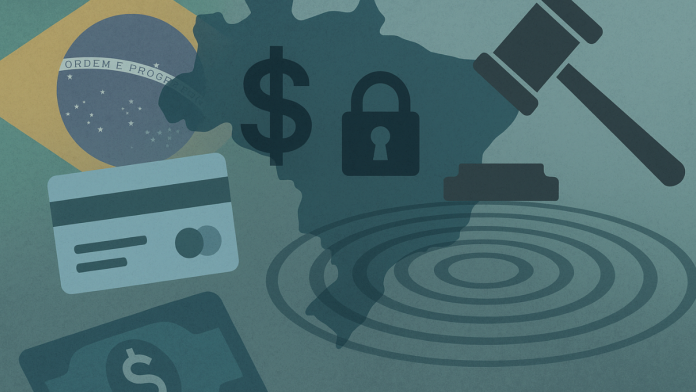Brazilian banks are racing to understand the fallout from sweeping U.S. sanctions imposed on Supreme Court Justice Alexandre de Moraes. The justice is overseeing a trial involving former President Jair Bolsonaro, accused of trying to overturn his 2022 election defeat. The U.S. has sanctioned Moraes under the Global Magnitsky Act, alleging human rights violations.
U.S. President Donald Trump called the trial a “witch hunt” and revoked Moraes’ U.S. visa, escalating the situation. The sanctions freeze any U.S.-linked assets and block American companies from doing business with Moraes. Although he holds no assets in the U.S., the move could prevent him from using services like Visa or Mastercard. Because global banking systems often rely on U.S. infrastructure, the impact could spread far beyond borders.
Banks in Brazil Caught Off Guard by U.S. Sanctions
The sanctions announcement caught major Brazilian banks off guard. Many are now urgently seeking legal advice to avoid risks. Marcelo Noronha, CEO of Bradesco, said the bank had hired legal experts to assess what actions must be taken.
A top-five bank, speaking anonymously, stated that their initial understanding is that operations in local currency should be safe. But anything involving international transfers or U.S. dollars could potentially breach sanctions rules. This uncertainty has left banks acting cautiously.
Trump Targets Brazil With 50% Tariff, Sanctions Top Judge in Bolsonaro Trial
These banks fear secondary sanctions — penalties that could be imposed if they’re found doing business with a sanctioned person. To stay on the safe side, some may block even permitted transactions to avoid being targeted by U.S. authorities.
So far, the Central Bank of Brazil has not issued guidance. Without official direction, financial institutions are being forced to interpret the rules themselves.
Legal and Financial Systems on High Alert
The sanctions apply even without direct financial ties in the U.S. That’s because many global systems — including payment networks — rely on American financial infrastructure. If a person is sanctioned, even simple transactions like using a credit card connected to Visa or Mastercard might get blocked.
Legal and compliance teams inside banks are now double-checking connections to U.S. firms. Some may go further than required, cutting off any potentially risky links. In complex cases like this, banks often prefer to over-comply than risk U.S. penalties.
This situation has created high alert across the industry. Legal and finance teams are navigating a maze of legal risks, customer rights, and global regulations — all while public attention grows.
Political Tensions Rise Over U.S. Action
The U.S. decision triggered strong political reactions in Brazil. President Luiz Inácio Lula da Silva condemned the sanctions, calling them interference in Brazil’s legal system. Vice President Geraldo Alckmin also defended the judiciary, saying judges should not be punished for doing their jobs.
⚔️ Moraes fights back — Supreme Court judge defies Trump’s tariffs, Bolsonaro’s pressure
On the other side, Eduardo Bolsonaro, a lawmaker and son of former President Jair Bolsonaro, welcomed the sanctions. He is currently in the U.S. lobbying for his father and pushing for amnesty for people who rioted after the 2022 election loss. Eduardo said online that the “cost of supporting Moraes will be unbearable.”
Justice Moraes was seen smiling and waving at a soccer match the same night the sanctions were announced. A photo of him making a rude gesture during the event quickly went viral on social media, drawing both criticism and support.
The U.S. sanctions were also paired with a new set of tariffs on Brazilian goods. These trade restrictions were directly linked to the trial, showing the U.S. sees the case as more than a domestic Brazilian issue.
The Global Magnitsky Act allows the U.S. government to target individuals overseas who are accused of corruption or human rights abuses. In this case, American officials claimed that Moraes was responsible for jailing people unfairly and restricting free speech. Brazil’s Supreme Court responded by reaffirming its role in protecting the constitution and the law.
As banks review their systems, the financial sector is now navigating legal, diplomatic, and political pressure — all unfolding at once.


